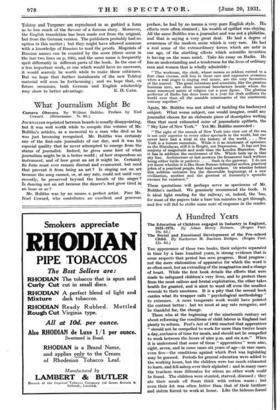What Journalism Might Be
Camera Obscura. By William Bolitho. Preface by Noel Coward. (Heinemann. 75. 6d.).
JOURNALISM reprinted between boards is usually disappointing, but it was well worth while to compile this volume of Mr. Bolitho's articles, as a memorial to a man who died as he was just becoming recognized. Mr. Bolitho was certainly one of the first-rate journalists of our day, and it was his especial quality that he never attempted to emerge from the status of journalist. Indeed, he gives some hint of what journalism might be in a better world ; of how stupendous an instrument, and of how great an art it might be. Certainly its form must ever remain diurnal and evanescent, but need that prevent it from being an art ? Is singing not an art because the song cannot, or, at any rate, could not until very recently, be preserved beyond the breath of the singer ? Is dancing not an art because the dancer's feet grow tired in an hour or so ?
Mr. Bolitho was by no means a perfect artist. Pace Mr. Noel Coward, who contributes an excellent and generous
preface, he had by no means a very pure English style. His effects were often strained ; his wealth of epithet was cloying. All the same Bolitho was a journalist and was not a philistine, and that is saying a very great deal. He had a degree of awareness of the modern scene which is very rare. He had a real sense of the extraordinary forces which are astir hi our age, of the startling effects which scientific invention is having on the mass mind. Take his essay on Radio. He has an understanding and a tenderness for the lives of ordinary men and women that is wholly admirable : " The workman, the clerk, whose means so seldom extend to a first class cinema, still loss to those rare and expensive occasions when a real singer is singing real music, are the very favourites of the marvel. The great inventors and scientists, like the greatest business men, are often universal benefactors beside whom the most renowned saints of religion cut a poor figure. The glorious perfecter of Radio has done more in a year for drab millions the world over than all the amiable missionaries of the nineteenth century together."
Again, Mr. Bolitho was not afraid of tackling the hackneyed subject. What worse subject, one would imagine, could any journalist choose for an elaborate piece of descriptive writing than that most exhausted mine of journalistic epithets, the " Sky Line of New York." Yet Mr. Bolitho succeeded :
" The sight of the onrush of New York into view out of the sea is not only superior to every other spectacle in the world, but can never have had a rival in the history of the world. . . . New York is a human mountain. While it is as intolerant of optimism as the Himalayas, still it is Height, not Depression. It has not less majesty of magnitude and scale than the London Mastodon. But it has in addition the excitement of life. Which boils up in that sky line. Architecture at last answers the firmament back without being either futile or pathetic. . . . Such is the gateway. I do not yet know whether it is like those Roman triumphal arches, practical jokes of a practical people, that lead nowhere. Or whether behind this sublime entrance lies the discernible beginnings of a new civilization, another and the greatest of humanity's sporadic excuses for existence."
These quotations will perhaps serve as specimens of Mr. Bolitho's method. We genuinely recommend the book. It is ideal light reading for the railway, or, indeed, the 'bus, for most of the papers take a bare ten minutes to get through, and few will fail to strike some note of response in the reader.










































 Previous page
Previous page